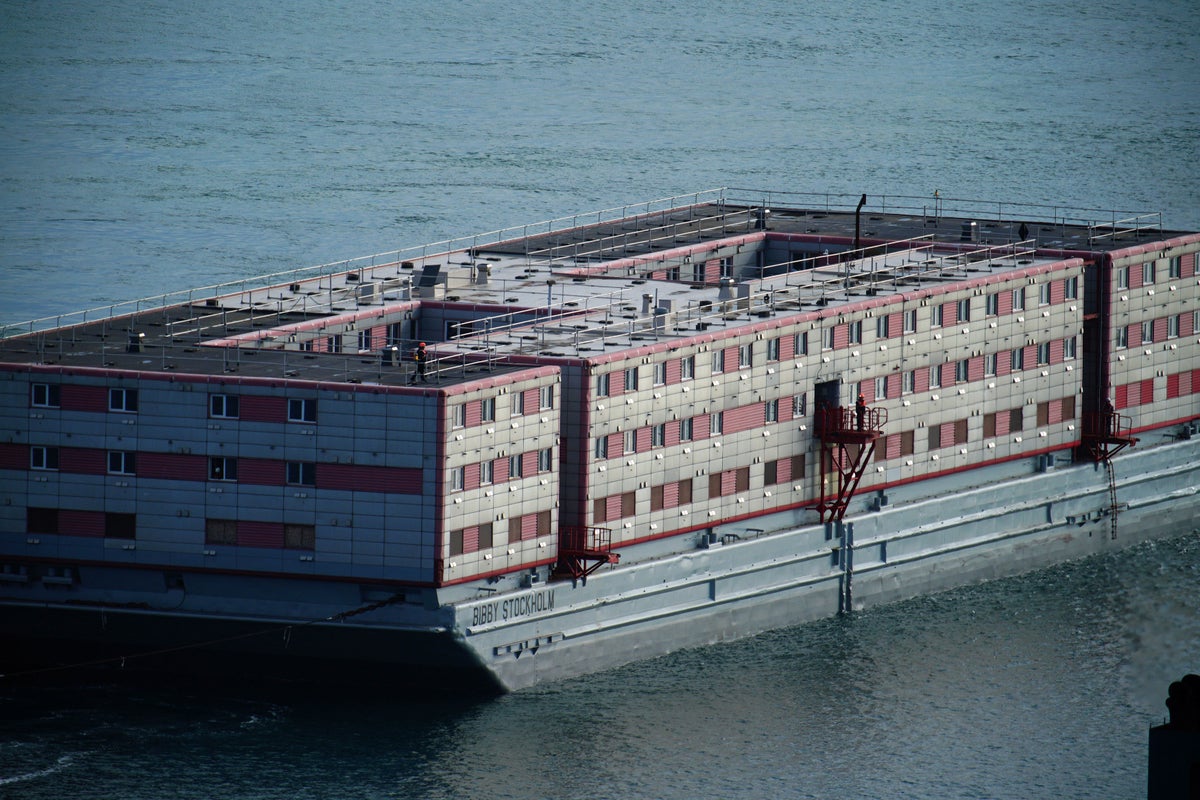
The Bibby Stockholm migrant barge, which has been likened to a “quasi-prison”, has arrived in Dorset.
Protestors gathered at the quayside on Tuesday morning as the vessel, which is set to house 500 asylum seekers, was pulled by tug boat Mercia into Portland Port.
Although the barge has arrived in its final destination, asylum seekers are not expected to arrive for another two weeks as further work is done to make it suitable for habitation.
The Independent understands the vessel must be connected to the Portland Port's fresh water, mains sewage network and other services, and then undergo more tests.
Asylum seekers will then be brought on board gradually, starting with around 50, and scaled up amid ongoing concerns over the Home Office's decision to increase the barge's capacity from 222 to 506 people.
Richard Drax, the Conservative MP for South Dorset, likened the barge to a “quasi-prison” and has voiced concern about its impact on both asylum seekers and the tourist-dependent local economy.
Although the barge is not a detention facility, Portland Port has said that asylum seekers will “not be free to move around the port” and must stay either on the Bibby Stockholm or in an adjacent “secure compound”.
A bus service is to be provided to take asylum seekers to destinations in the local area that will be agreed with local agencies, and port officials have denied that people will be “dumped” in one place.
The Independent understands that counter-terrorism officials have assessed the security surrounding the barge, following a terror attack on a Channel migrant facility in Dover and the persistent targeting of asylum hotels by far-right groups.
A private firm has been handed a £1.6bn contract to manage the Bibby Stockholm and other asylum accommodation and travel services, while the government is also covering costs for NHS services, the police and other public bodies.
The Bibby Stockholm accommodation barge— (PA)
The exact layout of the barge has not been revealed but analysis by The Independent revealed that asylum seekers will have less living space than an average parking space when it reaches full capacity.
Calculations show that at the full capacity claimed, each asylum seeker would have under 15 square metres of living space – the size of a typical car parking space according to Dorset Council.
An official brochure showed there were only 222 “single en-suite bedrooms” on board before the Home Office-commissioned changes began, meaning that at least two people may have to be crammed into every cabin for the government to achieve its claimed capacity.
The rooms will be fitted with en suite shower and toilet facilities, but the Home Office has refused to answer questions on whether bunk beds will be used to increase capacity on the vessel.
The vessel has a kitchen and restaurant, but it is unclear whether the Home Office has kept a previous TV and games room, gym and furnished bar.
The Bibby Stockholm was previously used by the Dutch government to detain asylum seekers in the 2000s.
At least one person died and there were reports of rape and abuse on the vessel. One asylum seeker described “four people in a cell” on board, according to a 2008 Amnesty International report obtained by The Independent.
“There is only a little daylight in the cells … in the morning the guards would open the cell with their nose covered to protect themselves against the stench,” the asylum seeker said.
“The conditions force you into submission; they kill you psychologically.”
The vessel was later used for commercial contracts to house workers, with its owners saying a “major refurbishment programme” took place before a 2013 charter for Petrofac created the current layout.
The official brochure for the Bibby Stockholm shows 222 single bedrooms, but the Home Office says it will house 500 asylum seekers— (Bibby Marine)
Asylum seekers will undergo security checks and be screened for “suitability” to be housed on the barge, meaning that physical and mental health checks may exclude some particularly vulnerable people.
Portland Port has said that all asylum seekers housed on the barge will be adult males with an age range of 18 to 65, and will “receive cultural awareness advice aimed at ensuring they understand the social norms in the UK”.
An undisclosed “code of conduct” is being imposed for behaviour on the vessel and on land, and there will be sport and cultural activities laid on by the Home Office.
The Freedom From Torture charity called the barge’s use “cruel and inhumane”, warning of a “catastrophe waiting to happen”.
Clinical services manager Ann Salter added: “Every day the survivors we speak to in our therapy rooms describe the horror, isolation, and hopelessness that results from being housed in dangerous accommodation. Packing refugees onto barges is a mental and physical health catastrophe waiting to happen.
“The government must abandon this plan immediately, and instead, address the asylum backlog which it has allowed to spiral out of control.”
Downing Street defended the use of the barge, insisting it is a cheaper alternative to hotels, where around 50,000 people are currently being accommodated at a cost of £6m a day.
It is also trying to shift asylum seekers to former military bases, but Suella Braverman’s attempt to bypass normal planning permission has sparked a wave of ongoing legal cases.
Around 50 migrants were moved to the former RAF Wethersfield site in Essex last week, but the planned use of RAF Scampton in Lincolnshire and a former Sussex prison has not yet begun.







